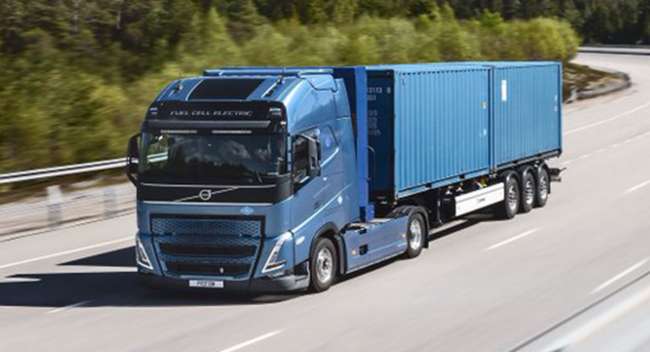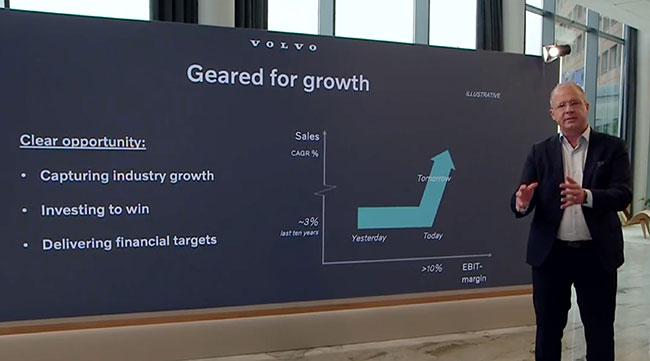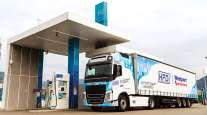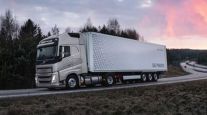Senior Reporter
Volvo Says Electric, Autonomous Programs Key to Growth

[Stay on top of transportation news: Get TTNews in your inbox.]
Volvo Group is looking to expand its autonomous and electric truck programs to build market share in its key U.S. market and drive revenue and profits higher, top executives said recently.
At the same time the company plans to strengthen its supply chain “step by step,” Volvo Group CEO Martin Lundstedt said during the company’s recent presentation for capital markets day (CMD).
“That has historically been one of the shortcomings that we have not been able to capture the full potential due to the supply chain’s lack of resilience,” he said, “not only related to the situation we have now, but generally speaking, and that is work that is ongoing.”

Volvo Group CEO Martin Lundstedt outlines the company's growth objectives during the capital markets day presentation. (Volvo Group via Twitter)
The company noted different dates are being suggested on when autonomous freight shipments will begin. Volvo believes that will start around the middle of this decade with a gradual shift that will take several years before the truck maker can cover all regions in the United States.
“Very soon we will open up our reservation program in the U.S. for autonomous freight capacity. So more news coming soon,” said Nils Jaeger, president of Volvo Autonomous Solutions.
Volvo expects to realize five times the revenue compared with a standard truck on autonomous solutions through transport as a service features.
Volvo's Autonomous Market Segments
• Confined areas: Such as mining and quarries. It has an in-house virtual driver it developed that is now available.
• First mile: Such as for ports and logistics. It partnered with Nvidia — with its artificial intelligence platform for training, simulation and in-vehicle computing — in 2019 to jointly develop a solution.
• Middle mile: or hub to hub. Starting in the U.S. It partnered with Aurora, which also supplies self-driving software and technology to Paccar Inc., whose North American brands include Kenworth Truck Co. and Peterbilt Motors Co.
In May, Volvo Autonomous Solutions, a Volvo Group company, announced it will offer a new hub-to-hub autonomous transport solution, designed to serve four main customer segments: shippers, carriers, logistics service providers and freight brokers. It partnered with logistics provider DHL Supply Chain as its first customer to pilot the hub-to-hub solution.
“Volvo intends to sell truck capacity instead of the autonomous truck, which in our view puts Volvo in direct competition with its fleet customers and is also different from Daimler Truck Group, which intends to sell autonomous trucks,” Himanshu Agarwal wrote in a note summarizing Volvo’s CMD.
Electric trucks and diesel engines will play large roles, too.
“We have a good product on the diesel side and the electric side in North America,” Volvo Trucks President Roger Alm said. “We are taking profitable market share with good price realization and good price increases that are getting out. And also, we have a leading position into the electric mobility.”
“We have electric trucks in customer operations in 21 countries around the world. And customers are coming back.” – Roger Alm, President @VolvoTrucks.
Watch #VolvoGroupCMD live here. https://t.co/PweBDEnqhB pic.twitter.com/SIy4coTbhq — Volvo Group (@VolvoGroup) June 22, 2022
Volvo intends to reach a target of 35% “fossil free” vehicles by 2030 and 100% by 2040, like its peers.
Volvo expects electrified trucks to generate 1.5 times higher revenue per vehicle due to higher unit value, greater penetration for services and longer duration contracts, according to Agarwal.
Overall, Volvo forecasts 50% of group revenue from services by 2030 compared with 21.5% in 2021, leading to higher margin and less volatile earnings through the cycle.
Agarwal also noted Volvo recently announced its entry into battery pack assembly, and it intends to integrate module assembly “as management believes they can add value to the highly automated process.”

Agarwal
“Volvo, at present, doesn’t intend to integrate battery cell manufacturing but will potentially add more cell suppliers, currently partnered with Samsung SDI,” he said.
The backdrop for Volvo’s efforts is a process it calls CAST ( common architecture and shared technology).
CAST is meant to develop modular products and services that can be easily integrated to meet legal, market and societal needs, and that exceed customer expectations, according to Volvo.
The modular approach shares technology for engines, electronics, transmissions, chassis, connectivity, electromobility and automation among its business areas.
Want more news? Listen to today's daily briefing below or go here for more info:




